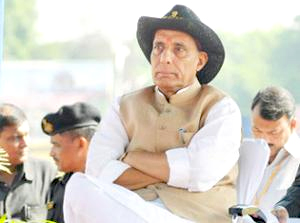Tel Aviv, Nov 6: Indian Home Minister Rajnath Singh arrived in Israel for what would be his first visit abroad to discuss bilateral issues including strengthening security ties and fight against terror.

The Minister was in Monaco to attend Interpol's General Assembly.
Despite the unexpected change in Singh's plans, Israel has rolled out a red carpet welcome for him going out of the way to accommodate his revised schedule and the Prime Minister's Office here was quick to set up his meeting with Prime Minister Benjamin Netanyahu today evening.
"India is a very important ally for us andwe view the Home Minister's visit as very significant. We are looking forward to fruitful discussions that will strengthen cooperation between the two countries", a senior Israeli government source said.
It will be the first visit of an Indian Home Minister to Israel since June 2000 when L K Advani visited Jerusalem, marking an upsurge in bilateral cooperation.
Singh's visit comes close on the heels of Prime Minister Narendra Modi's meeting with Netanyahu on the sidelines of the UNGA in New York in September.
During that meeting, Netanyahu had said that 'sky is the limit' in terms of prospects of cooperation between the two countries, seeking 'greater and greater' ties with India.
Singh will also be meeting Israel's Minister of Public Security, Yitzhak Aharonovich, and National Security Adviser (NSA), Yossi Cohen, who would accompany him on a helicopter tour of bordering areas.
India and Israel have signed three agreements related to homeland security which covers important areas such as cooperation in preventing organized crime, human trafficking, cyber crimes, money laundering, counter-terrorism and fight against spread of fake currency notes.
Cohen had last month met Singh, NSA Ajit Doval and senior diplomats at the Ministry of External Affairs in Delhi to discuss 'common challenges' faced by the two countries and their solutions, emphasizing his country's 'willingness to expand cooperation in all fields and in any level.'
India is Israel's largest purchaser of defence equipments and the Jewish state is the second largest supplier of arms and armaments for New Delhi, next only to Russia.
Singh will also try to impress upon Israel Defence Industries to take advantage of the new policies to manufacture in India as per Modi's 'Make in India' initiative and assure them of a simple regulatory framework to obtain clearances within a stipulated time frame.








Comments
Add new comment